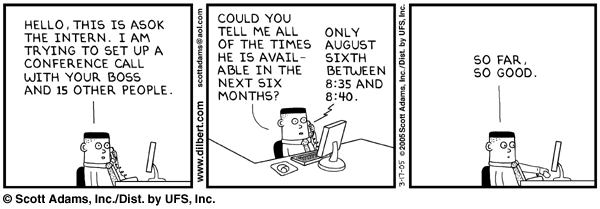Research
I work in the area of Artificial Intelligence. In particular, I am interested in designing effective methods for multiagent interaction, in both team and adversarial environments.
Interests: Negotiation, Game Theory, Experts/Bandit Algorithms, Multiagent Learning and Agent Modeling

Some of the projects I have worked on are listed below.
CMRadar - A Personalized Calendar Management Assistant
 | The CMRadar project is part of the Radar project, which is funded by DARPA's PAL (Personalized Assistant that Learns) program. Collaborators: Steve Smith, Manuela Veloso, Jay Modi, Jean Oh and Akiva Leffert. |
We have developed prototype CMRadar agents that can communicate with each other to schedule meetings for their users. My research has focused on a number of learning problems within this domain. In particular, we have developed approaches to:
- learning the scheduling preferences of a user;
- learning models of other users/agents;
- learning how to negotiate more effectively and efficiently with other agents.
CMRoomRadar - Room Finding Agent
 | CMRoomRadar is part of the CMRadar project. Collaborators: Steve Smith, Manuela Veloso, Jay Modi, Jean Oh. |
CMRoomRadar is part of the CMRadar project. In many institutions individuals can reserve rooms for functions and meetings. CMRoomRadar agents negotiate with agents/people that have reserved rooms in order to find suitable venues for new meetings that arise over time. CMRoomRadar agents learn, for various situations, which agents are likely to give up their rooms by changing to another room or rescheduling.
CMCast - Robotic Soccer Commentary

| Collaborators:Manuela Veloso, Nicholas Armstrong-Crews, Sonia Chernova, Colin McMillen, Maayan Roth and Douglas Vail. |
Collaborators: Judy Kay, Eric McCreath The I-EMS project was concerned with developing an intelligent assistant for sorting and classifying email into folders. |
Our contributions include:
- A novel learning algorithm that combines instance based and rule based information, which is described in our ICML 2002 paper.
- Design of a testing framework for e-mail classification that takes into account the temporal nature of the data. This frame-work is described in our ADCS 2001 paper.
- Design of an e-mail interface aimed at making classification decisions scrutable, and minimizing the cost of incorrect classification to the user. For further information please see our IUI 2002 paper.
- Empirical evaluation of a variety of Machine Learning techniques on a per-user and per-folder basis.
The Logic Tutor
 | Collaborators:David Abraham, Leanna Lesta, Agathe Merceron, and Kalina Yacef |
The Logic Tutor is an intelligent tutoring system for propositional logic. It provides targeted exercises and feedback to assist students in learning to construct formal proofs. The tool has been incorporated into the Languages and Logic course at the University of Sydney where it has been found to improve learning outcomes.